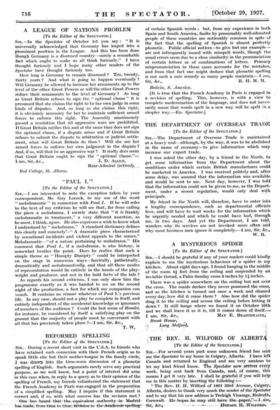A LEAGUE OF -NATIONS PROBLEM
[To the Editor of the SPECTATOR.]
Sta,—In the Spectator of October 1st you say : " It is universally acknowledged that Germany has leaped into a Prominent position in the League. And this has been done though Germany is a disarmed' country—surely a remarkable fact which ought to make us all think furiously." I have thought furiously and I hope many other readers of the Spectator have thought furiously too.
How long is Germany to remain disarmed ? Ten, twenty, thirty years ? And what is going to happen eventually ? Will Germany be allowed to increase her armaments up to the level of the other Great Powers or will the other Great Powers reduce their "armaments to the level of Germany ? As long as Great Britain refuses to sign the " optional clause " it is presumed that she claims the right to be her own judge in some kinds of disputes. And, so long as she claims this right, it is obviously necessary for her to maintain sufficient armed forces to enforce this right. The Assembly unanimously passed a resolution that all aggressive wars are prohibited. If Great Britain ratifies this and at the same time does not sign the optional clause, if a dispute arises and if Great Britain refuses to submit the dispute to arbitration or judicial settle- ment, what will Great Britain do then ? Will she use her armed forces to enforce her own judgment in the dispute ? And, if so, will that be an aggressive war.? - It really does seem that Great Britain ought to sign the " optional blause."-:7.
Rear-Adiniral (retired).
Red Cottage, St. Albans.


























































 Previous page
Previous page